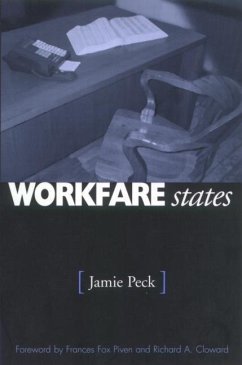This book examines the political economy of workfare, the umbrella term for welfare-to-work initiatives that have been steadily gaining ground since candidate Bill Clinton's 1992 promise to "end welfare as we know it." Peck traces the development, diffusion, and implementation of workfare policies in the United States, and their export to Canada and the United Kingdom. He explores how reforms have been shaped by labor markets and political conditions, how gender and race come into play, and how local programs fit into the broader context of neoliberal economics and globalization. The book cogently demonstrates that workfare rarely involves large-scale job creation, but is more concerned with deterring welfare claims and necessitating the acceptance of low-paying, unstable jobs. Integrating labor market theory, critical policy analysis, and extensive field research, Peck exposes the limitations of workfare policies and points toward more equitable alternatives.
Hinweis: Dieser Artikel kann nur an eine deutsche Lieferadresse ausgeliefert werden.
Hinweis: Dieser Artikel kann nur an eine deutsche Lieferadresse ausgeliefert werden.








